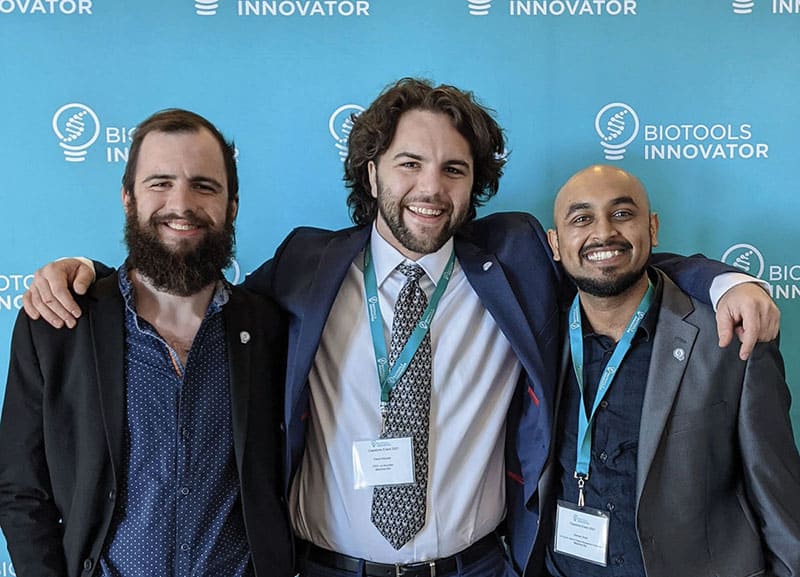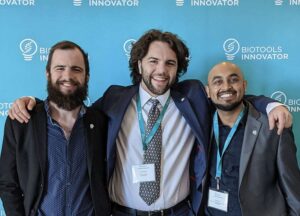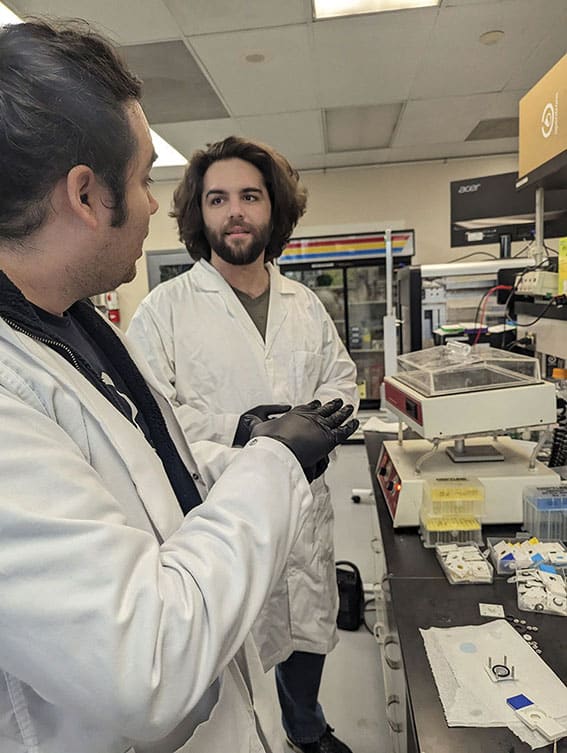Claremont biotech firm wins Technology in Space Prize

By Lisa Butterworth | special to the Courier
The co-founders of Machine Bio, a Claremont-based biotechnology startup, have gotten pretty good at innovating radical solutions for their industry here on earth. But soon, their technology will be tested in less-charted territory: space. Machine Bio was recently awarded the Technology in Space Prize, which includes up to $500,000 in grant funding. It also means their technology, which revolutionizes protein synthesis, will be shuttled off for research in the U.S. National Laboratory aboard the International Space Station.

(L-R) Alex Hilbert, David Marash, and Naman Shah of Claremont biotech firm Machine Bio. Photo/courtesy of David Marash.
“We never really saw ourselves as a space company, but looking at the technology and the values it can provide, we really do see benefits there,” said Alex Hilbert. Hilbert, David Marash, and Naman Shah founded Machine Bio in 2019, when the concept of launching their work out of the atmosphere wasn’t even a twinkle in these innovators’ eyes.
“[Receiving the award] was great validation that this technology, that started off as an idea that we shared, is now something that some of the most impactful institutions actually see as something that can be a difference maker,” said Marash. “Little David, little Alex, little Naman — 20 years ago if you told any of us that our technology’s going to go up to space we’d be like, ‘Whoa, that’s crazy!’ So, it’s just got that inherent cool factor.”
In biotech, especially the pharmaceutical industry, protein is a key product. It can be a drug —antibodies are proteins, insulin is a protein — and it can be used as a tool to develop new types of medicine. It can also be a component of diagnostic tests (Marash references the COVID-19 spike protein as an example). But making protein is costly, time consuming, and labor intensive. The typical process takes a week or longer. First, live cells are coded for the particular type of protein needed and then grown until there are enough cells to put into a large bio reactor. This is where the cells begin to make the protein. But once the protein is made, there are then a number of steps needed to remove all of the impurities that the process creates.
At Machine Bio, they’re “taking the whole process and shrinking it down to a single step,” Marash said. And that single step takes only an hour. “It’s faster, it’s leaner, it’s smaller, so you can fit it on places like the International Space Station,” said Marash, holding up one of their bio reactors, which fits between his thumb and forefinger. Programmed DNA goes in one side of the reactor; the pure protein comes out the other.

(L-R) Aster Escalante and David Marash in the lab at Claremont biotech firm Machine Bio. Photo/courtesy of David Marash.
While the typical protein synthesis process employs physics to filter out pure proteins, Machine Bio’s bio reactor employs the power of biology. “The cell membrane is very, very smart. It lets specific little molecules through these little gates, so we asked ourselves, What if we build one of those gates into a synthetic membrane?” Marash said, explaining the inner workings of their reactor. “This smart membrane lets us move protein from the reaction mixture to this pure compartment, with nothing else getting across.”
Though some might wonder if cost-cutting innovations would simply allow pharmaceutical companies to increase their profits, Hilbert asserts that Machine Bio’s revolutionary process is less about lowering costs and more about lowering the barriers to innovation. “By speeding up these processes, instead of taking X amount of years to get to the market from development, you maybe cut six months or a year off of that time,” he said. “Especially if it’s a particularly drastic, serious disease, then anytime you can get a drug onto the market faster, you get to help more people.”
Hilbert and Marash met while attending Claremont’s Keck Graduate Institute, a leader in biotech and healthcare education. “I met David pretty close to the beginning of our time [at KGI]. I remember I was standing in line to get our photos taken and he goes, ‘Hey, can I tell you about an idea I’ve got? Also, my name’s David,’” Hilbert said with a laugh. “He explained the idea, and at the time it was a little more science fiction-y than science, but we developed it and by the time we graduated he had this idea for Machine Bio.”
Along with Shah, who Hilbert knew from undergrad work at Arizona State University, they launched the company right after graduation, renting bench space in one of KGI’s teaching labs. In late 2021, Machine Bio hired three full-time research team members as well. Now, thanks to the Technology in Space Prize they received in February, which is funded by Boeing and the Center for the Advancement of Science in Space in partnership with nonprofit MassChallenge’s startup accelerator program, they plan to have their bio reactors space bound in 2024.
If you’re wondering why, you’re not alone. Even Machine Bio’s co-founders didn’t realize how much protein-based drug research was being done in space until recently. And if their bio reactors work as successfully on the International Space Station as they do on earth, they could help accelerate that research exponentially.
The microgravity of space offers a unique environment for drug research. An organization studying cancer drugs, for instance, might have much more success there — artificial tumors grow more accurately without gravity pressing down on them, increasing researchers’ ability to predict whether a drug is going to work. But if the experimentation requires any protein engineering, researchers have to simply wait for another shuttle to deliver proteins synthesized on earth. Machine Bio is hoping their technology can change that, by providing the ability to quickly create research-ready proteins in space.
Though $500,000 may sound like a large sum, the Machine Bio founders are even more enthusiastic about the access the Technology in Space Prize is providing. “The money is nice, but we’re not really seeing much of that money. Believe it or not astronauts are very expensive to pay by the hour,” Hilbert said with a laugh. “I’m really excited about all the doors that [the prize is] opening up. Because even if you have the means to send your things to the International Space Station, it’s not like you can just hit them up and say, ‘Hey, I’m bringing my stuff over, make some room.’ This is opening the door for a whole new market and area for us to explore.”









0 Comments